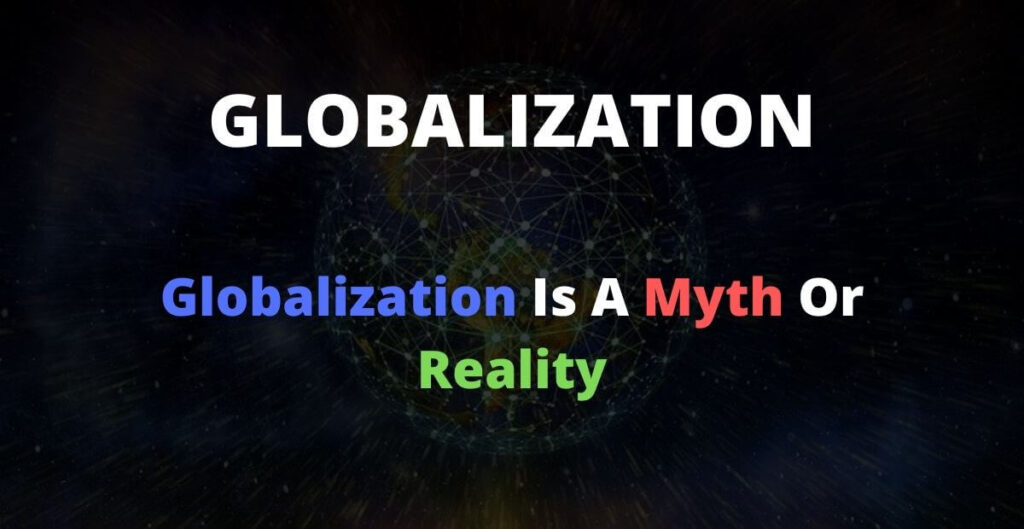Globalization has become an important discussion topic in recent world politics. Globalization generally means free trade, transfer of technology, economic growth, and so on. As a result of globalization, any country can increase its business anywhere in the world.
Must Read- What Is Globalization and History of Globalization [4 Phases]
But is it really a privilege for developing or underdeveloped nations? in this article I have clearly answered the question that globalization is a myth or reality.
What do Supporters of Globalization think?
Proponents of globalization believe that globalization will lead to the fasting of a stable and downtrodden economy, the potential for capital investment will be greatly increased, and the introduction of a liberalized economy will increase the opportunities for mutual cooperation and competition in the industry and trade, transfer of technology to third world countries. This open market economy will end the shortage of foreign currency and will curb inflation.
Must Read– 5 Important Types Of Globalization
People will have the opportunity to participate in the selection of the products of their choice, and on the one hand, the promotion of promising teachers and researchers, and on the other hand, the domination of the unqualified and inefficient can be eliminated. Only supporters of globalization think that in this new economic system, the administrative structure can be relieved of bureaucratic control and pressure.
Globalization is a Myth or Reality
No, my friend, it’s not real. Not all countries of the world are able to gain the benefits of this so-called globalization freely. Here I try to illustrate the real picture of globalization. Here is the Reality-
Globalization refers to a new kind of policy or strategy by which former imperialist and capitalist countries seek to continue their economic and cultural domination and exploitation over developing or underdeveloped countries.
The capitalist countries adopted new strategies, adjusting to the new situation in order to maintain their economic exploitation, as no special colonial interests were possible to maintain or colonize. And that strategy is called globalization. Experts often say that globalization is not a new but “old wine in a new bottle”.
Must-Read- 9 Advantages and Disadvantages of Globalization
In the Context of Post WWII
After World War II, significant changes occurred in the economic development process of developing countries of the world, especially in the western influenced liberal democratic countries.
During this time, a lot of emphases was placed on government initiatives and planned economic systems, and confidence was established in the economic progress and development of most developing countries.
Countries in Africa, Asia, and Latin America especially followed this model. But as the results of two decades went by, third-world countries lost confidence in this model. Industrialized countries also suffer a lot.
Structural Adjustment Programs (SAPs) were to bring relief from the economic crisis that had occurred at that time and spread this initiative all over the world, especially in third-world countries.
The main goal of SAPs was to provide loans through World Bank and IMF to developing countries for economic changes but with conditions. And that condition was basically founded on two principles. These two policies are the continuation of economic policies pursued by developed countries and the exclusion of the existing economic and social policies.
At the same time, the importance of globalization and liberalization of the economy was emphasized through the process of eliminating import controls on goods. And from there, the journey of globalization has begun as a fine tool of neo-colonialism.
Globalization as a Fine Tool of Neo-Colonialism
Neo-colonialism is a new strategy for influencing developing countries, using capitalism, globalization, and cultural imperialism. Unlike previous colonial methods, the system does not require direct military control or indirect political control.
The main goal of a capitalist or industrialized state is to economic dominance over former colonies in any way through globalization.
The economic decline, the lack of capital, the lack of science and technology, the lack of modern industries, the dependence on the agrarian economy, and poverty devour the underdeveloped and developing countries.
As a result, capital and credit are needed for economic development. And only the capitalist countries are able to meet that need at that time. On the economic side, one of the neo-colonialism strategies is to provide poor countries with financial aid and lending arrangements to exploit them. The developed countries have provided conditional loans to other countries.
The borrower has never been able to use it on his own. Where the lender has decided where the money spend. The developed countries demand interest in large.
In many cases, it has been observed that underdeveloped and developing countries cannot pay interest regularly. As a result, the amount of foreign debt has gone out of control and dependency has increased.
For example, in the 1990s, India started the process of economic reformation and the attempt to modernize has been widespread. But it requires a huge amount of foreign debt.
IMF & World Bank imposed conditions for restructuring of the economy, privatization in the public sector, expansion of private enterprises, the liberation of the gates of the Indian economy abroad, subsidies in certain areas including food, and liberalization of the economy.
As a result of Globalization and liberalization capitalist countries have also made the repayment system difficult. Repayment of loans in foreign currency has been imposed. But, because of the low foreign exchange rate of developing and underdeveloped countries, they face many problems in the repayment of loans.
It is undoubtedly true that capitalist countries have used debt and financial assistance as their main foreign policy tools.
Development of Capitalism through Globalization
Another important feature of globalization is capital investment. Capitalist countries regularly invest capital in underdeveloped countries. This does not mean boosting the economy of the poorer countries. Capitalist countries invest surplus money abroad.
This is one of the key signs of capitalist development. However, capitalism has a specialty. They do not invest in the countries where the poorest countries will gain much, but rather they invest in the countries where they can make the most profit.
Africa produces lots of diamonds, gold, and chromium. But even 10 percent of these assets do not have access to African public access. Because foreign capital controls this wealth.
Capitalist countries have always sought to control underdeveloped and developing countries. The main purpose of establishing control is to make maximum profit by buying raw materials at cheaper prices and selling products at higher prices.
Also, cheap labor is available. For this reason, MNCs, especially industrial and business organizations of developed countries, have been encouraged to invest and produce in developing countries. The products produced here are sold at a higher price to other countries and they make a profit. For example, it can be said that Pepsi, and Coca-Cola, these MNCs in India have opened their factories. Due to the low cost of raw materials and labor in India, that is why this industry and trade have been increasing steadily.
Due to the investment in developing countries, the gain of developed countries can be easily realized.
From the writing of Professor Nirmal Kanti Ghosh, I got some data that make clear the capitalist country’s intentions. Between the years 1953 and 1972, private US investment in developing countries was 4500 billion dollars. And between 1960 and 1961, US multinationals made 6700 billion dollars in profit within a year, preserving the amount of capital invested in Latin America. In 1966, direct US investment abroad was 13666 billion dollars, direct income was 2352 billion dollars. In 1979, direct investment was $ 44525 billion and earnings amounted to $ 13127 billion, almost one-third of the investment.
Trade Imbalance
Another aspect of globalization is to make the Third World a threat to the world market. There is no doubt that economically powerful countries exercise restraining powers in the international market for commodity market prices.
The quantity of products in the exports of underdeveloped and developing countries is very low. Moreover, their exports are mainly based on agricultural products. For this reason, capitalist countries reduce the income from foreign trade of developing countries by reducing the mobilization of these products in the international market.
It should be noted that the United States has intimidated many developing and developing countries by abusing Special 301. As a result of its use, capitalist countries have made underdeveloped countries poorer by restricting of selling of third-world products. Poor countries are being instrumental in importing low-quality consumer goods into capitalist countries with the opportunity of poverty.
Consumerism through Globalization
From the above discussion, it is implied that developed countries are trying to take advantage of various adverse conditions by using globalization as a strategy. Developed countries seek to keep developing countries dependent on them economically through foreign loans, aid, and trade agreements.
In the name of the Transfer of technology, capitalist countries discourage developing countries to develop domestic technology. Developed countries have made efforts to transform the Third World into a market for their products and made a center for exports of raw materials. Under pressure from developed countries and multinational companies, developing countries have become consumer countries.
Conclusion
From the above discussion on Globalization as a Myth or Reality, it can be stated that however, in the current international system, new international policies have expanded the competitiveness of world trade to such an extent that many third-world countries have invited globalization today, considering development and economic infrastructure restructuring.
But as a long-term consequence of globalization, developing countries have always acknowledged the subjugation of capitalist countries in terms of financial credit, technology import, and investment.
Let me share with you what you have learned from globalization as a Myth or Reality.
Recommended Book
Book Title- GLOBALIZATION OF WORLD POLITICS: AN INTRODUCTION TO INTERNATIONAL RELATIONS
Author Name- Steve Smith John Baylis
Must Read–


Comments are closed.